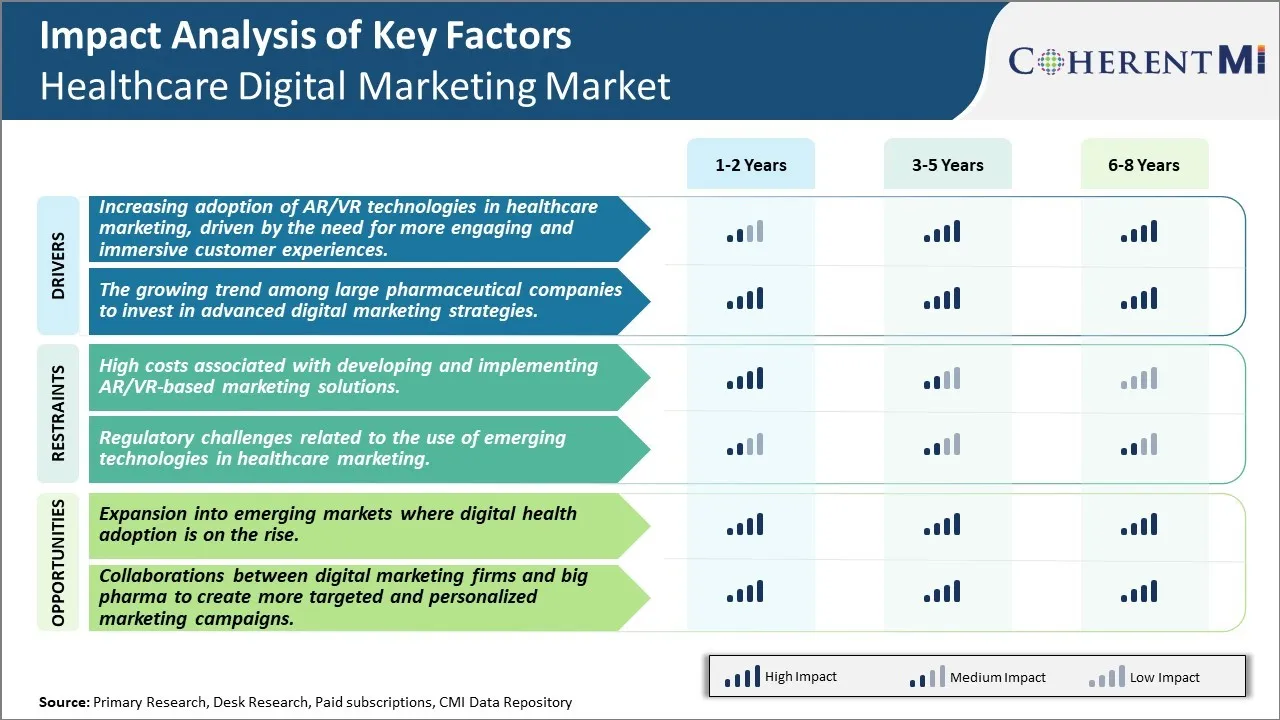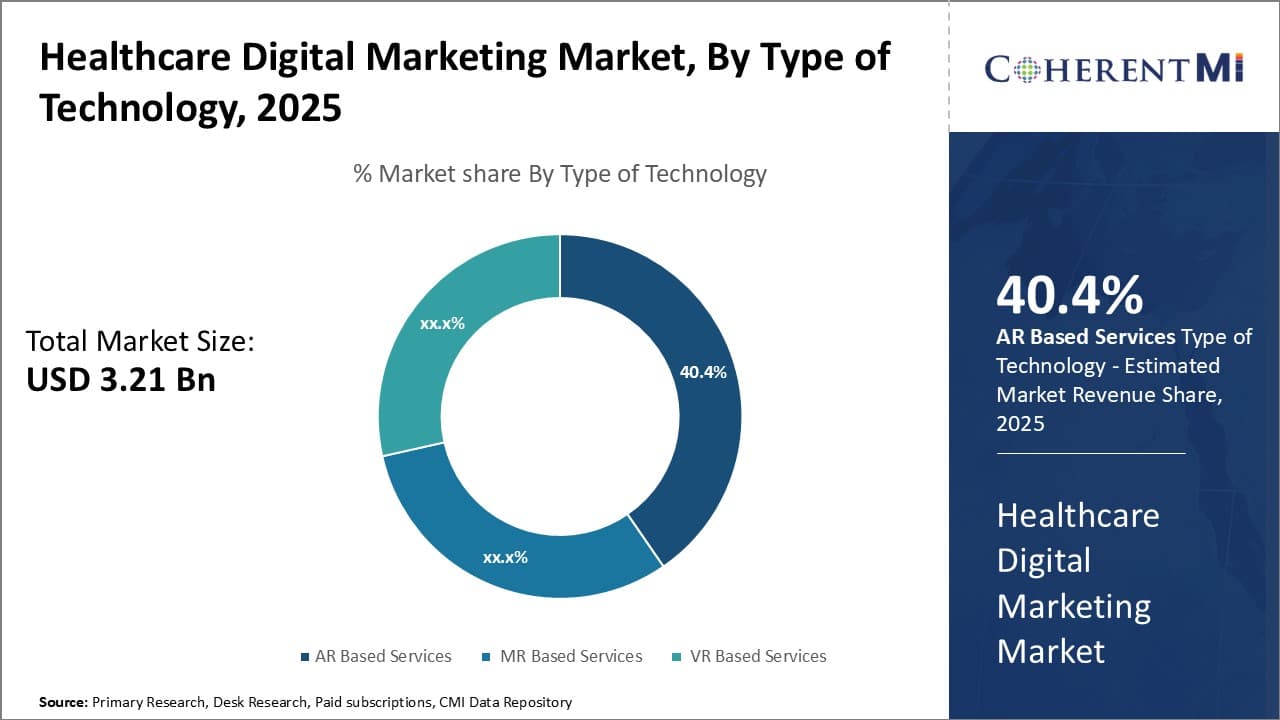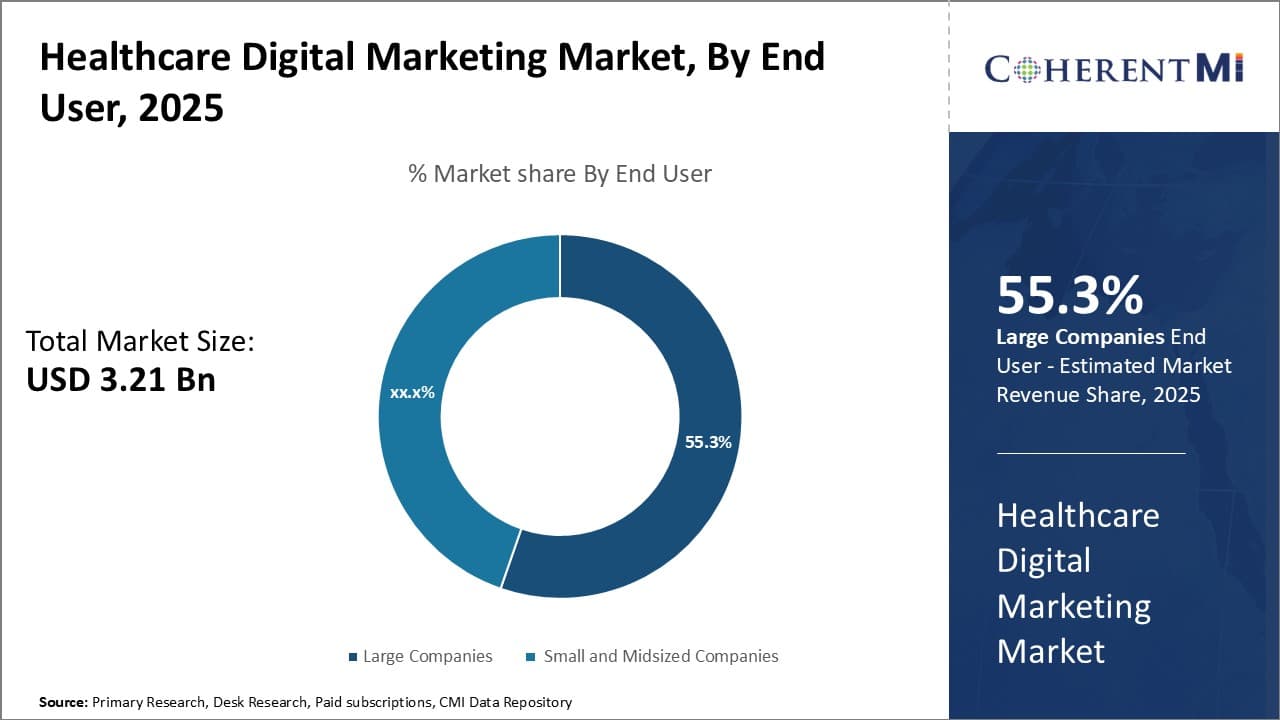Healthcare Digital Marketing Market Size - Analysis
The healthcare digital marketing market is estimated to be valued at USD 3.21 Billion in 2025 and is expected to reach USD 16.82 Billion by 2032, growing at a compound annual growth rate (CAGR) of 26.7% from 2025 to 2032. This robust growth can be attributed to increased healthcare spending and growing focus on online channels by healthcare providers and insurers to target customers.
Market Size in USD Bn
CAGR26.7%
| Study Period | 2025-2032 |
| Base Year of Estimation | 2024 |
| CAGR | 26.7% |
| Market Concentration | High |
| Major Players | ARworks, CG Life, CubeZoo, Impact XM, INVIVO Communications and Among Others |
please let us know !
Healthcare Digital Marketing Market Trends
Market Driver - Adoption of AR/VR Technologies in Healthcare Marketing Bolsters Engaging and Immersive Customer Experiences
Many healthcare organizations today, are leveraging augmented reality (AR) / virtual reality (VR) technologies. AR/VR provides an immersive experience that helps patients better understand complex medical procedures, treatments or conditions. For example, it gives them a virtual tour of the operating room or shows a 3D representation of internal body parts. Such experiences leave a lasting impact and increase compliance. AR applications equipped with object recognition abilities also allow non-verbal patients to communicate.
The technology is being used in various other ways too - to train medical professionals, for rehabilitation purposes, for pain distraction and more. Medical colleges are introducing AR/VR simulation labs to offer hands-on experience to students in a risk-free virtual setting. Physical therapists leverage virtual reality games to motivate and engage patients during their recovery process. Some applications even enable remote clinical consultations and second opinions by medical experts thousands of miles away.
The COVID-19 pandemic has further highlighted the need for technologies like AR and VR. During the lockdowns, it ensured continuity of care and education. Medical conferences transitioned to virtual modes using these tools. With their benefits becoming more evident, healthcare organizations recognize the potential of XR technologies to enhance patient experience and outcomes.
Market Driver - Growing Trend Among Large Pharma Companies to Invest in Advanced Digital Marketing Strategies
Large pharmaceutical companies already spend a major portion of their promotional budgets on digital channels. They actively carry out various online initiatives - from content marketing and social media engagement to SEO campaigns and paid ads. The objective is to stay connected with patients and healthcare professionals through multiple touching points. Companies offer health-related information, condition-specific resources, trial results, brand stories and more on their websites and other digital properties.
Besides the general website, many pharma leaders are building specialized microsites or apps focused on particular therapy areas, diseases or drugs. These are better optimized for mobile and social and help foster intimate brand relationships. Real-world evidence is also digitally shared through online journals, magazines and discussion forums read by the medical community. Product launches are live-streamed on social networks to engage a wider audience.
There is growing focus on performance marketing using advanced digital tools such as programmatic advertising, machine learning and analytics. Companies evaluate spending ROI across channels using detailed reports. AI and automation are leveraged to personalize messaging, predict patient needs and streamline marketing operations. The digital transformation in pharma marketing aims to bring added precision, engagement and productivity as competition further intensifies in the industry.
 To learn more about this report, Download Free Sample Copy
To learn more about this report, Download Free Sample Copy
Market Challenge - High Costs Associated with Developing and Implementing AR/VR-based Marketing Solutions
One of the major challenges currently faced by players in the healthcare digital marketing space is the high costs associated with developing and implementing AR and VR-based marketing solutions. Developing engaging and interactive AR/VR experiences for healthcare requires heavy investment in technologies like wearables, sensors, cameras and graphics rendering. It also necessitates employing specialists such as 3D modelers, programmers and graphic designers to develop immersive digital content. Additionally, creating AR/VR content and solutions suitable for various medical conditions is a lengthy and complex process that takes months of R&D and testing. All of these factors contribute to significantly high development costs running into millions of dollars.
Moreover, integrating such advanced digital solutions with legacy healthcare IT infrastructure requires additional expenses. The costs involved in regular upgradation of AR/VR technologies and replacement of devices also impacts profit margins of companies. Given the nascent stage of AR/VR adoption in healthcare currently, it is challenging for marketing firms to justify such substantial investments and see immediate returns. The high development costs pose a major bottleneck in widespread deployment of next-gen immersive digital solutions across the healthcare industry.
Market Opportunity - Expansion into Emerging Markets Where Digital Health Adoption is on the Rise
One key opportunity available for players in the healthcare digital marketing space is the expansion into emerging markets where adoption of digital health technologies is increasing rapidly. Countries in Asia, Latin America, Middle East and Africa are witnessing significant growth in internet and smartphone penetration along with rising disposable incomes in recent times. This has positively impacted digital accessibility and receptivity of consumers in such emerging healthcare domains.
At the same time, these nations are also gradually overcoming challenges around lack of infrastructure and resources to embrace new-age digital health solutions. Therefore, they present a substantial untapped market potential for healthcare digital marketing firms to promote their services. By tailoring low-cost digital marketing solutions suitable for such environments, companies can gain first-mover advantage. Additionally, partnerships with local digital health startups provide opportunities to scale footprint and customize offerings.
Overall, emerging markets offer a promising avenue for growth to healthcare digital marketing players given their rising digitization and increasing healthcare needs of large untapped consumer base. This can help offset limitations in saturated mature markets in the long run.
Key winning strategies adopted by key players of Healthcare Digital Marketing Market
Content marketing: Providing valuable, informative, and engaging content is a great way to position the brand as a thought leader while driving leads. For example, Mayo Clinic created an intense content marketing strategy that included blogs, videos, eBooks and social media. They focused on topics people search for related to health conditions, wellness, research and treatments.
Social media engagement: Healthcare organizations have heavily leveraged social platforms like Facebook, Twitter, LinkedIn, YouTube to engage with customers and promote their brand/services. Cigna, for example, has over 1 million Facebook followers and generates high engagement through regular posting of health and wellness videos and guides.
SEO optimization: Companies focus on keyword research, optimizing website pages, getting relevant backlinks to rank higher for targeted search terms. For instance, WebMD focused on ranking for 2500+ health related keywords through ongoing content updates, internal linking and community building efforts on their website and partner domains.
Pay Per Click (PPC) ads: PPC advertising plays a strong role, allowing healthcare companies to show up in paid search results and drive instant traffic. Crafting targeted, keyword-rich ads and optimizing bid amounts and budgets is crucial.
Segmental Analysis of Healthcare Digital Marketing Market
 To learn more about this report, Download Free Sample Copy
Insights, By Type of Technology - Rethinking Healthcare with Augmented Reality
To learn more about this report, Download Free Sample Copy
Insights, By Type of Technology - Rethinking Healthcare with Augmented Reality
In terms of technology, AR-based services contribute to the highest share of the market owning to its unique ability to overlay digital information and graphics onto the real world. AR offers an engaging and intuitive way for doctors to interact with patients, delivering a more personalized care experience. By leveraging AR, providers can visually demonstrate treatment plans and surgical procedures, helping patients better understand complex medical conditions. During scans and exams, AR tools give radiologists and technicians an augmented view inside the body, highlighting key areas and overlaying patient histories for easier diagnosis.
AR is also streamlining training for medical students and new physicians. Through augmented simulations, trainees can experience realistic scenarios, learn from mistakes in a safe environment, and obtain skills difficult to learn traditionally. As AR technology advances, its applications in healthcare will continue expanding to encompass remote care, medical record visualization, and more personalized treatment roadmaps. The true power of AR lies in its capacity to make medical care more informative, collaborative and customized to individual needs.
 To learn more about this report, Download Free Sample Copy
To learn more about this report, Download Free Sample Copy
Insights, By End User - Empowering Healthcare's Biggest Players
In terms of end users, large companies contribute to the highest share of the market due to their robust resources and existing customer networks. Large healthcare providers and insurers have come to recognize the business opportunity of digital marketing and are making significant investments. With extensive budgets, major companies can develop cutting-edge in-house digital solutions or acquire smaller tech firms leading innovation.
They also possess sizable patient and member bases that enable targeted digital campaigns at scale, helping improve customer retention and cross-sell additional services. Large brands see engagement on their own websites and mobile apps as a strategic priority to strengthen relationships and influence the evolving consumer healthcare journey.
Data and analytics play a key role, with large firms able to glean actionable insights from immense customer databases to further personalize messaging. While nimbler startups continue pioneering new technologies, large enterprises are well-positioned to adopt solutions, customize them for vast operational needs, and spread digital transformation throughout global operations.
Insights, By Type of Product - Meeting Users Where They Interact
In terms of product type, hardware contributes to the highest share of the market due to people increasingly relying on devices as their primary points of access for all activities, including managing healthcare. Laptops, desktops, smartphones and digital tablets place medical information, services and support right in the hands of consumers anytime, anywhere. Device-based digital marketing allows providers to reach active healthcare audiences engaging with an expanding selection of mobile medical apps and web-enabled tools.
Through push notifications, in-app messaging and carefully-timed calendar reminders, users can stay on top of appointments, prescriptions and test results without disrupting natural technology habits. Kiosks and clinical hardware also enhance the patient experience, bringing check-ins, wayfinding and virtual consultations directly to waiting areas and exam rooms. Wearables now monitor health from behind the scenes as well. As digital become more interwoven into daily living, marketing penetrating the user interfaces consumers love will be pivotal for providers striving to deliver convenient healthcare on any preferred device.
Additional Insights of Healthcare Digital Marketing Market
- The majority of companies offering AR/VR services are small to mid-sized, with a notable number established between 2011-2015, reflecting the market's rapid growth.
Competitive overview of Healthcare Digital Marketing Market
The major players operating in the healthcare digital marketing market include ARworks, CG Life, CubeZoo, Impact XM, and INVIVO Communications.
Healthcare Digital Marketing Market Leaders
- ARworks
- CG Life
- CubeZoo
- Impact XM
- INVIVO Communications
Recent Developments in Healthcare Digital Marketing Market
- In September 2020, the report highlights the growing interest of big pharma in adopting AR/VR technologies for enhanced marketing strategies, leading to increased collaborations with digital marketing firms.
- In 2023, the market witnessed a surge in VR-based project revenues, and it is expected to account for around 40% of the overall market share by 2030.
- Several big pharma companies have already integrated AR/VR technologies into their marketing efforts, significantly enhancing customer engagement through immersive experiences.
- The healthcare digital marketing sector is becoming increasingly dominated by AR-based projects, contributing 57% to service revenues as of 2020.
- Service revenues from MR technologies are anticipated to grow at a CAGR of 5% until 2030.
Healthcare Digital Marketing Market Segmentation
- By Type of Technology
- AR Based Services
- MR Based Services
- VR Based Services
- By End User
- Large Companies
- Small and Midsized Companies
- By Type of Product
- Hardware
- Software
Would you like to explore the option of buying individual sections of this report?
Manisha Vibhute is a consultant with over 5 years of experience in market research and consulting. With a strong understanding of market dynamics, Manisha assists clients in developing effective market access strategies. She helps medical device companies navigate pricing, reimbursement, and regulatory pathways to ensure successful product launches.
